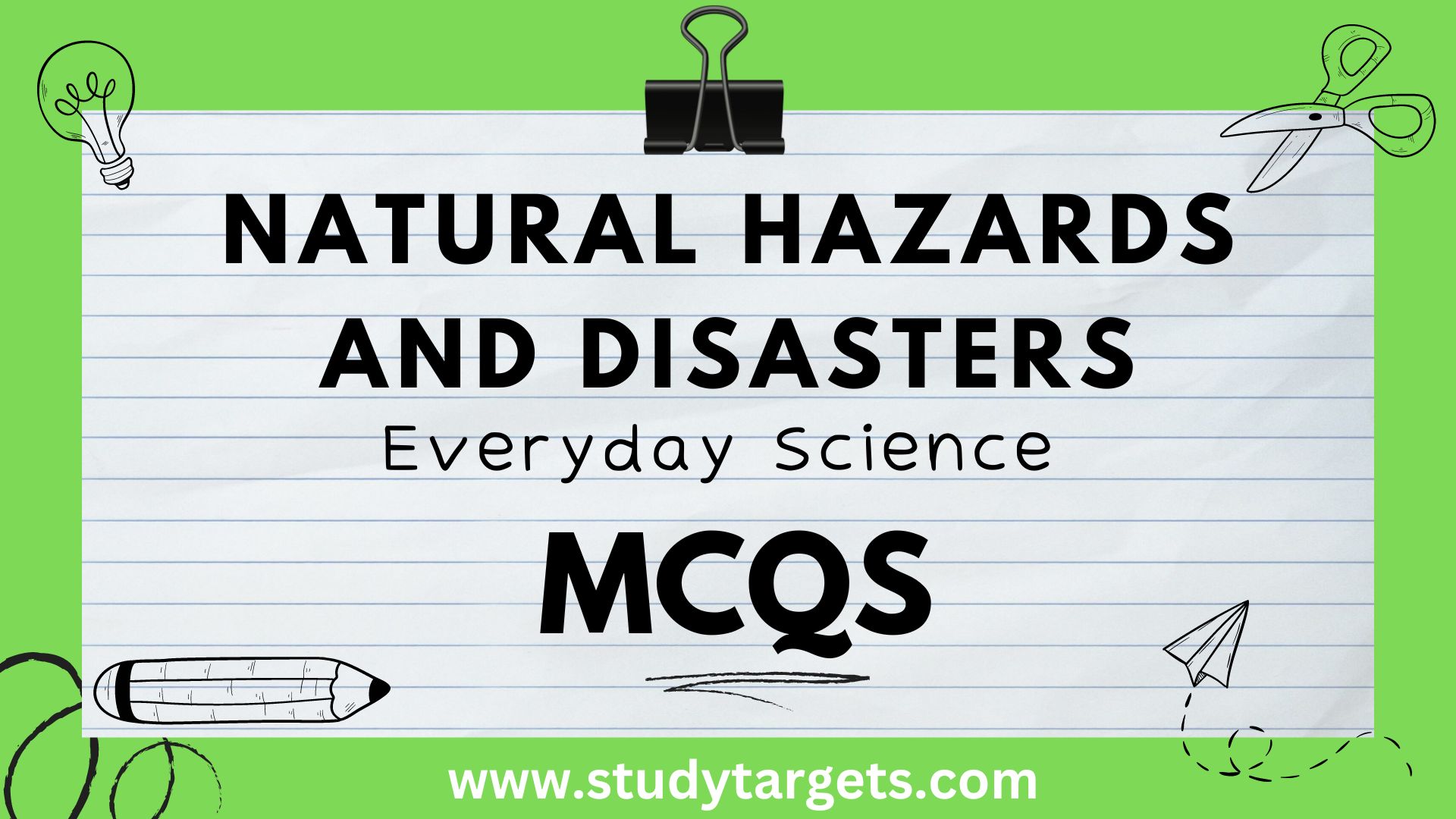Natural Hazards and Disasters
1. What is the term used to describe a sudden and violent shaking of the ground caused by the movement of tectonic plates?
a) Tsunami
b) Hurricane
c) Earthquake
d) Volcanic eruption
Answer: c) Earthquake
2. Which natural hazard is characterized by a rotating column of air extending from a thunderstorm to the ground?
a) Earthquake
b) Tornado
c) Flood
d) Drought
Answer: b) Tornado
3. What is the primary cause of tsunamis?
a) Volcanic eruptions
b) Earthquakes
c) Hurricanes
d) Landslides
Answer: b) Earthquakes
4. A prolonged period of below-average rainfall leading to water scarcity is known as:
a) Tornado
b) Drought
c) Flood
d) Cyclone
Answer: b) Drought
5. Which natural disaster is caused by the rapid release of energy in the Earth’s crust resulting in seismic waves?
a) Hurricane
b) Tornado
c) Earthquake
d) Volcanic eruption
Answer: c) Earthquake
6. Which natural hazard involves a large and destructive ocean wave, often caused by undersea earthquakes or volcanic eruptions?
a) Hurricane
b) Tornado
c) Tsunami
d) Drought
Answer: c) Tsunami
7. What is the term for a rotating low-pressure weather system with thunderstorms and strong winds?
a) Cyclone
b) Tornado
c) Hurricane
d) Earthquake
Answer: c) Hurricane
8. Which natural disaster is caused by the sudden eruption of molten rock, ash, and gases from a volcano?
a) Earthquake
b) Tornado
c) Tsunami
d) Volcanic eruption
Answer: d) Volcanic eruption
9. A sudden and intense oceanic event, often triggered by underwater earthquakes, causing the rapid displacement of water and massive waves, is known as:
a) Cyclone
b) Tsunami
c) Hurricane
d) Tornado
Answer: b) Tsunami
10. Which natural disaster is characterized by excessive rainfall leading to the inundation of land areas?
a) Drought
b) Tornado
c) Hurricane
d) Flood
Answer: d) Flood
11. A weather system with a low-pressure center and rotating winds is known as:
a) Cyclone
b) Tornado
c) Hurricane
d) Earthquake
Answer: a) Cyclone
12. Which natural hazard involves the flow of fast-moving debris and rock down a slope, often triggered by heavy rain or volcanic activity?
a) Landslide
b) Earthquake
c) Tornado
d) Tsunami
Answer: a) Landslide
13. The enhanced greenhouse effect, leading to global warming and climate change, is primarily caused by increased emissions of which gas?
a) Carbon dioxide
b) Oxygen
c) Nitrogen
d) Hydrogen
Answer: a) Carbon dioxide
14. What is the term for a severe weather system with low atmospheric pressure, high winds, and heavy rain, typically forming over warm ocean waters?
a) Cyclone
b) Tornado
c) Hurricane
d) Tsunami
Answer: c) Hurricane
15. A large-scale disaster that occurs over a wide geographic area and affects a significant number of people is known as:
a) Natural hazard
b) Catastrophe
c) Emergency
d) Crisis
Answer: b) Catastrophe
16. Which natural disaster is characterized by a violent and destructive rotating column of air that extends from a thunderstorm to the ground?
a) Cyclone
b) Tornado
c) Hurricane
d) Earthquake
Answer: b) Tornado
17. A sudden and intense atmospheric disturbance with strong winds and heavy rainfall, often occurring over tropical oceans, is known as:
a) Hurricane
b) Tornado
c) Tsunami
d) Cyclone
Answer: d) Cyclone
18. Which natural hazard involves the overflow of water onto normally dry land due to heavy rainfall or the melting of snow and ice?
a) Tsunami
b) Earthquake
c) Drought
d) Flood
Answer: d) Flood
19. What is the term for a prolonged period of excessive heat and dryness, resulting in water shortages and crop damage?
a) Tsunami
b) Drought
c) Flood
d) Volcanic eruption
Answer: b) Drought
20. Which natural disaster involves a rapid and violent air circulation, characterized by a low-pressure center and high winds, usually forming over warm ocean waters?
a) Cyclone
b) Tornado
c) Hurricane
d) Earthquake
Answer: c) Hurricane
